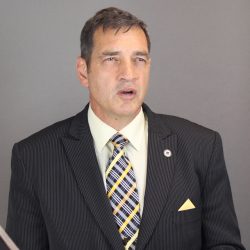
I've always been told that I needed to manage my time, so I get up at the crack of dawn and work until dusk. I make a schedule every day, build agendas for my meetings, and I try to be physically present at each event that is important to my family and me. I always thought that scheduling everything down to the minute was an effective way to manage myself.
My son's baseball games are one of these events that are important to me. There's one particular game that I remember, where I brought my computer along to do some work. We've all done it before. But being a good father, when it was time for my son to step up to the plate, I would close my computer so I could watch him intently.
But once his at-bat was completed, my attention would immediately return to my computer. After the game, my son came up and said, "Dad, I know your work is important and you don't have to be here if you don't want to be." I asked him why he would say that! I always showed up on time and watched every play he was in. He said "Dad, it is not about you being here on time, it is about you being engaged while you are here. You are here physically, but not mentally." My son really made me think. Am I living life to the fullest and am I managing the right things?
As I started trying to find the answers to this question, I quickly realized that like many others, I was measuring the wrong things. The book that opened my eyes was The Power of Full Engagement by Jim Loehr and Tony Schwartz. This book discussed that managing energy, rather than time, is the key to high performance and personal renewal.
There are three main lessons in the book:
- Manage Your Energy and Not Your Time: This means that if you are at your son's game, put the computer down and stay engaged with the game from start to finish. Encourage all the players and not just your son.
- Measure Your Energy in Four Energy Tanks: Physical, Mental, Emotional and Spiritual. Physical energy is your foundation and is based upon how well you feel. Make sure you exercise, eat right, and receive the proper amount of sleep to keep this tank full. Mental energy is your capacity to think clearly and rationally under pressure. Emotional energy is having quality interactions with others, along with the satisfaction and comfort that these interactions bring to you. Finally, spiritual energy is having clarity, intensity, purpose, and vision. Spiritual energy is not your religion, it is more like a compass in life that points you in the right direction.
These four tanks are interconnected, and when one drains, the others will also start to drain. By paying attention to these tanks during the day, you will start to notice that they have a much larger impact on your performance than managing your time. I sure did. - The last lesson is to accept your limitations: Being honest with ourselves and accepting that we have limitations is the first step in dealing with them. Once you accept this, then you should learn how to work within those limitations. Just like Clint Eastwood's "Dirty" Harry Callahan said in Magnum Force, "A man has got to know his limitations."
Now that I manage my energy and not my time I am more focused and engaged. I am physically, emotionally, mentally, and spiritually present in mind and in body instead of always focusing on the next "to do" on my list. Life is not meant to be measured in how many tasks we check off that list.
Philip F. Johndrow is a 33-year military veteran and a graduate of Trident's Bachelor of Science in Business Administration and Master of Business Administration programs. He currently serves as Trident's National Director of Military & Veteran Alliances.

